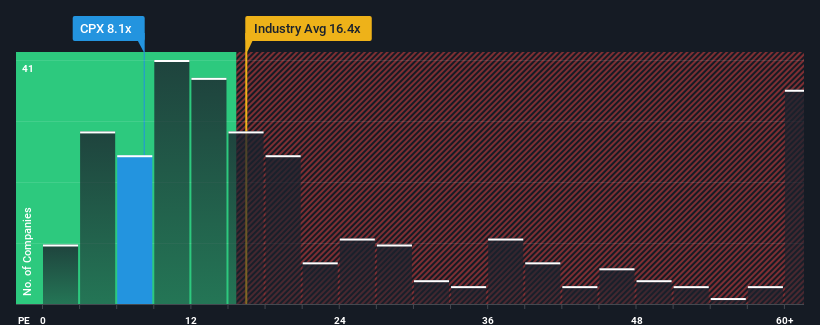- Canada
- /
- Renewable Energy
- /
- TSX:CPX
Why Investors Shouldn't Be Surprised By Capital Power Corporation's (TSE:CPX) Low P/E

Capital Power Corporation's (TSE:CPX) price-to-earnings (or "P/E") ratio of 8.1x might make it look like a buy right now compared to the market in Canada, where around half of the companies have P/E ratios above 15x and even P/E's above 32x are quite common. However, the P/E might be low for a reason and it requires further investigation to determine if it's justified.
With its earnings growth in positive territory compared to the declining earnings of most other companies, Capital Power has been doing quite well of late. It might be that many expect the strong earnings performance to degrade substantially, possibly more than the market, which has repressed the P/E. If not, then existing shareholders have reason to be quite optimistic about the future direction of the share price.
View our latest analysis for Capital Power

Is There Any Growth For Capital Power?
There's an inherent assumption that a company should underperform the market for P/E ratios like Capital Power's to be considered reasonable.
Retrospectively, the last year delivered an exceptional 131% gain to the company's bottom line. Pleasingly, EPS has also lifted 179% in aggregate from three years ago, thanks to the last 12 months of growth. Accordingly, shareholders would have probably welcomed those medium-term rates of earnings growth.
Shifting to the future, estimates from the eight analysts covering the company suggest earnings growth is heading into negative territory, declining 9.3% per annum over the next three years. That's not great when the rest of the market is expected to grow by 7.8% each year.
With this information, we are not surprised that Capital Power is trading at a P/E lower than the market. Nonetheless, there's no guarantee the P/E has reached a floor yet with earnings going in reverse. Even just maintaining these prices could be difficult to achieve as the weak outlook is weighing down the shares.
The Key Takeaway
While the price-to-earnings ratio shouldn't be the defining factor in whether you buy a stock or not, it's quite a capable barometer of earnings expectations.
As we suspected, our examination of Capital Power's analyst forecasts revealed that its outlook for shrinking earnings is contributing to its low P/E. At this stage investors feel the potential for an improvement in earnings isn't great enough to justify a higher P/E ratio. It's hard to see the share price rising strongly in the near future under these circumstances.
It's always necessary to consider the ever-present spectre of investment risk. We've identified 4 warning signs with Capital Power (at least 2 which make us uncomfortable), and understanding these should be part of your investment process.
It's important to make sure you look for a great company, not just the first idea you come across. So take a peek at this free list of interesting companies with strong recent earnings growth (and a low P/E).
New: AI Stock Screener & Alerts
Our new AI Stock Screener scans the market every day to uncover opportunities.
• Dividend Powerhouses (3%+ Yield)
• Undervalued Small Caps with Insider Buying
• High growth Tech and AI Companies
Or build your own from over 50 metrics.
Have feedback on this article? Concerned about the content? Get in touch with us directly. Alternatively, email editorial-team (at) simplywallst.com.
This article by Simply Wall St is general in nature. We provide commentary based on historical data and analyst forecasts only using an unbiased methodology and our articles are not intended to be financial advice. It does not constitute a recommendation to buy or sell any stock, and does not take account of your objectives, or your financial situation. We aim to bring you long-term focused analysis driven by fundamental data. Note that our analysis may not factor in the latest price-sensitive company announcements or qualitative material. Simply Wall St has no position in any stocks mentioned.
About TSX:CPX
Capital Power
Develops, acquires, owns, and operates renewable and thermal power generation facilities in Canada and the United States.
Undervalued with adequate balance sheet and pays a dividend.
Similar Companies
Market Insights
Community Narratives



